Key takeaways:
- Key aspects of venue contracts include understanding cancellation policies, payment schedules, and liability insurance to avoid potential issues.
- Selecting the right venue impacts the event’s overall experience, with factors like capacity, atmosphere, and accessibility being crucial.
- Negotiation is essential; being transparent about needs can foster better terms, and addressing hidden fees upfront helps avoid budget surprises.
- Thoroughly reviewing contracts and ensuring all agreements are documented prevents misunderstandings and misinterpretations. Collaboration with others can help identify overlooked details.
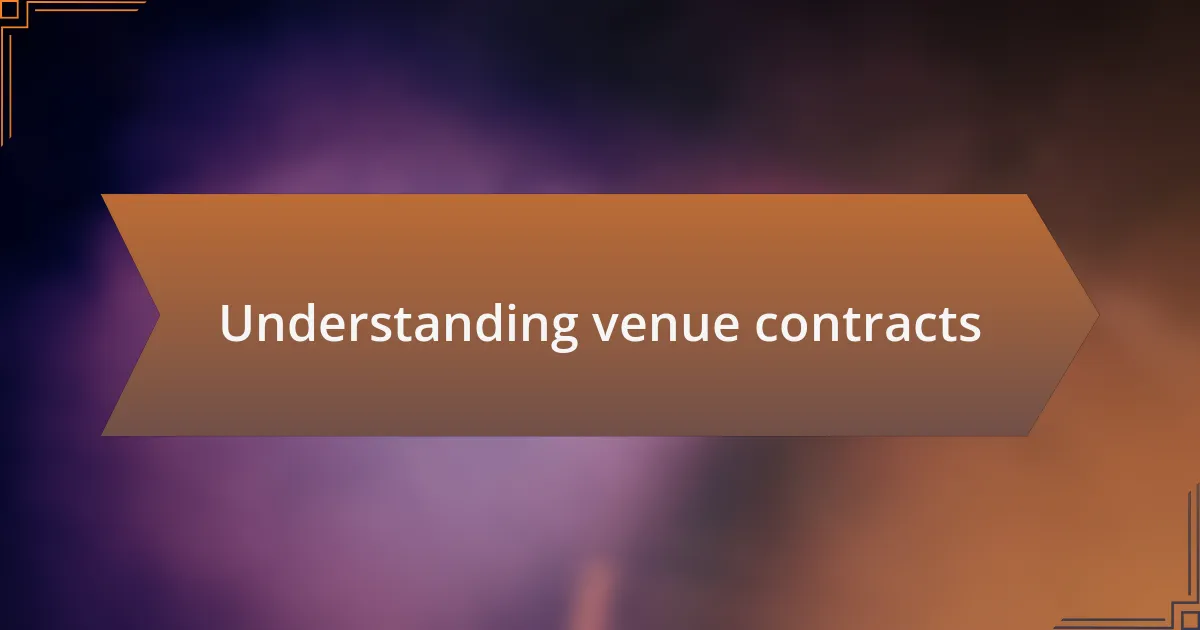
Understanding venue contracts
When I first delved into the world of venue contracts, I was overwhelmed by the legal jargon. I remember grappling with clauses that seemed designed to confuse rather than clarify. Have you ever found yourself caught in a web of terms that feel impossible to decipher? It’s crucial to break down these documents into manageable pieces, focusing on key aspects like cancellation policies and payment schedules.
One important aspect to understand in venue contracts is the flexibility they offer. I once had a venue that initially seemed inflexible, but after a few discussions, we found common ground. This experience taught me that open communication often leads to adjustments that work for both parties. Have you ever negotiated a term that ended up making the event smoother? Keep in mind that negotiations are part of the process, and it’s okay to ask for changes.
Additionally, it’s vital to pay attention to the specifics about liability and insurance. I learned this the hard way when an unexpected incident occurred at an event I managed. That experience underscored the importance of ensuring that both you and the venue are adequately protected. How can we overlook something that crucial? Understanding these details can save you from potential headaches down the road, ensuring a seamless event experience.
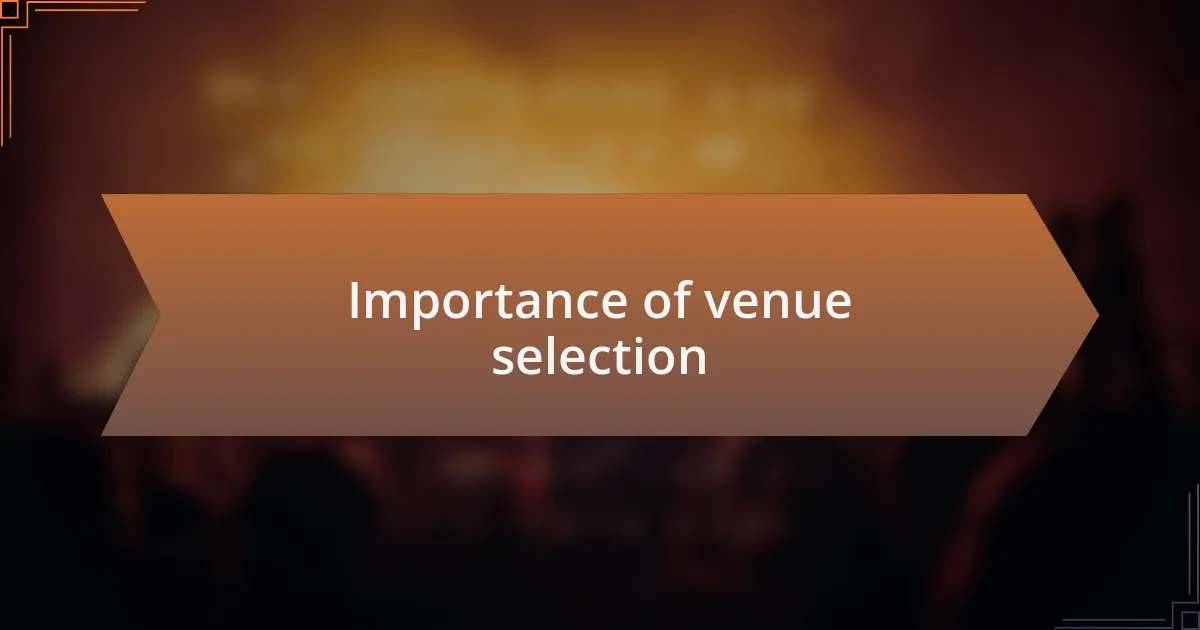
Importance of venue selection
Selecting the right venue can make or break an event. I remember planning a corporate retreat and thinking the first venue I visited was perfect. However, after selecting it, I realized its capacity didn’t meet our needs, resulting in guests feeling cramped. Have you ever experienced a space that just felt too small or too large? The wrong venue can lead to discomfort and distract from your event’s purpose.
The atmosphere of a venue sets the tone for the entire event. I once held a fundraising gala in a highly ornate ballroom, and it created an air of luxury that made our guests feel special. The right setting not only enhances the experience but also aligns with your event’s theme. How do you want your attendees to feel? If the venue communicates the right message, it can elevate their overall experience.
Accessibility is another vital factor that can’t be overlooked. I encountered challenges when a portion of our guests struggled to find parking at a venue that was stunning but isolated. A venue should ensure that all attendees can easily arrive and feel welcomed. Have you considered how transportation and accessibility can impact your event? Optimizing these aspects can significantly improve attendance and satisfaction, helping you create a memorable experience for everyone involved.
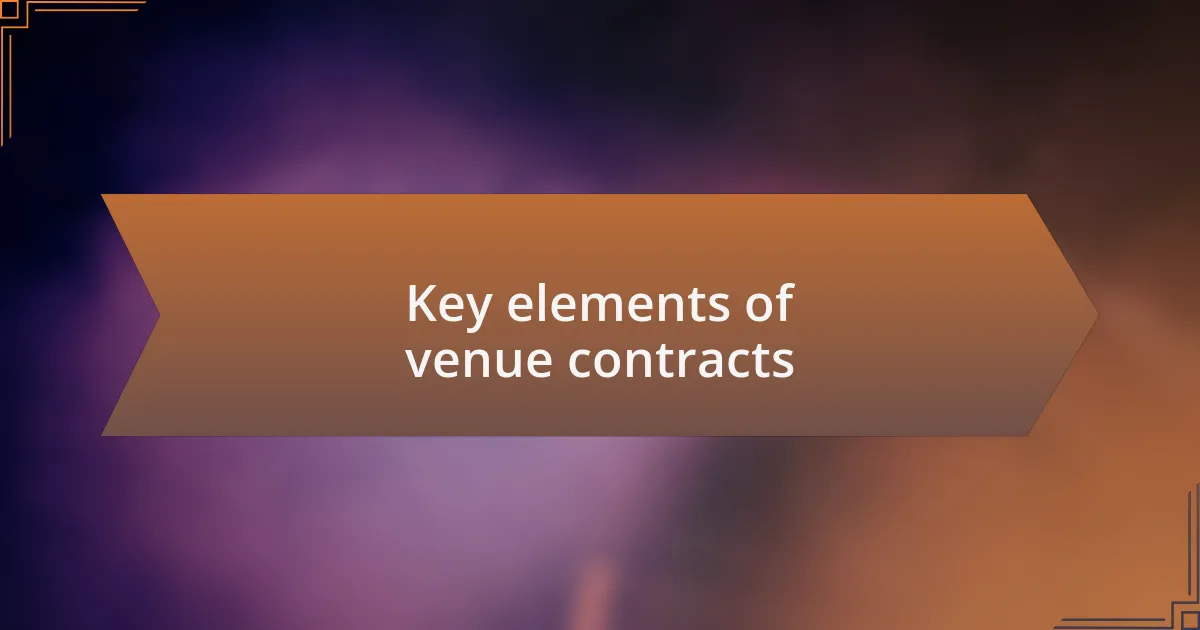
Key elements of venue contracts
When reviewing venue contracts, one essential element is the clarity of the terms regarding capacity and layout. I once overlooked this detail, assuming the venue’s published capacity was sufficient, only to find out later that their definition of “capacity” didn’t account for my specific setup needs. This can lead to either overcrowding or having too much space, which completely alters the event’s dynamics; have you ever sat in an overly spacious room and felt isolated?
Another critical aspect is the cancellation and refund policies. I’ve been in a situation where an unexpected storm forced us to reconsider a venue. Understanding the terms of cancellation well in advance was essential to mitigate financial loss and stress. What would you do if faced with a last-minute change? Knowing that you have a safety net helps in making confident decisions.
Lastly, don’t underestimate the importance of inclusivity regarding amenities and services offered by the venue. I once chose a beautiful location but overlooked the fact that it didn’t offer onsite catering. This led to a frantic last-minute search for a caterer who could accommodate special dietary needs. Questions like, “What services are included, and which are extra?” can save you from unexpected hassles. Having a comprehensive understanding of these details is crucial to ensure a seamless event experience.
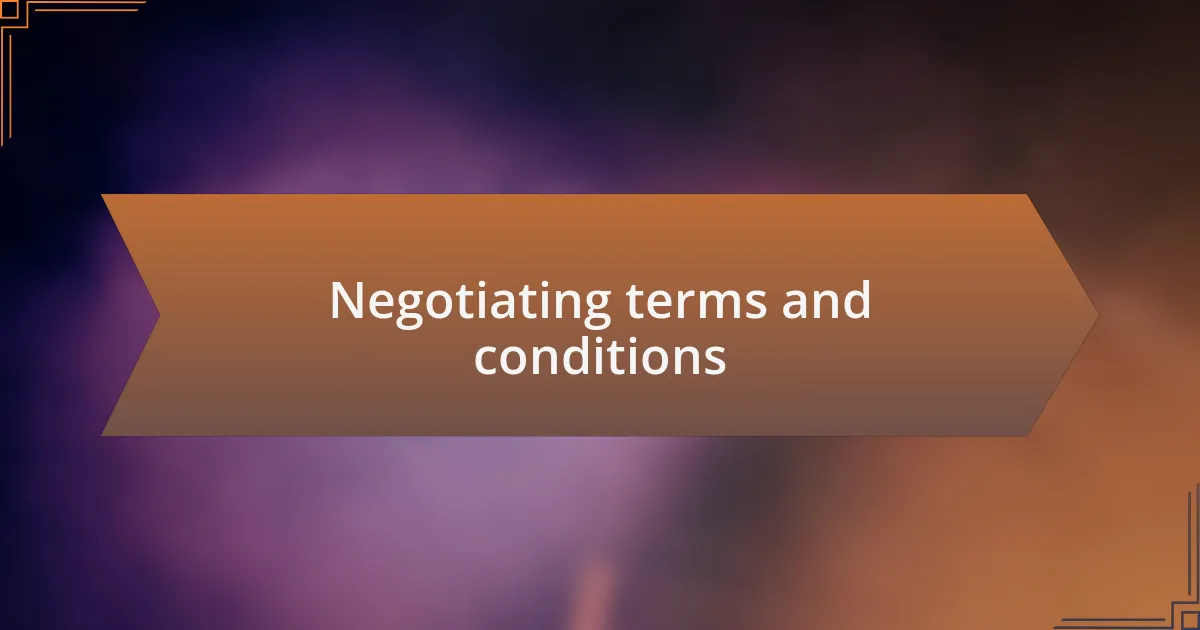
Negotiating terms and conditions
Negotiating terms and conditions is where the real magic of event planning happens. I’ve often found that being upfront about your needs can foster a more productive dialogue. For instance, I once expressed my concerns about the sound limitations in a venue, only to learn that they could offer temporary solutions, such as installing additional sound equipment. Have you ever missed an opportunity simply because you hesitated to ask?
Understanding and negotiating the financial aspects can also significantly impact your event’s success. During one negotiation, I pushed back on the flat fee structure because it didn’t account for possible additional guests. It felt risky at the time, but ultimately, we reached an agreement that allowed for a more flexible pricing model. Can you imagine the relief of knowing you won’t be penalized for accommodating extra friends or family?
Another crucial point to consider is the inclusivity of additional charges that might not be immediately apparent. I recall a situation where I learned too late about hidden fees for security staff and cleaning services after the event. By addressing these potential add-ons upfront, I was able to build a budget that truly reflected all costs associated with the venue. Isn’t it better to have a clear understanding of your total investment before the big day arrives?
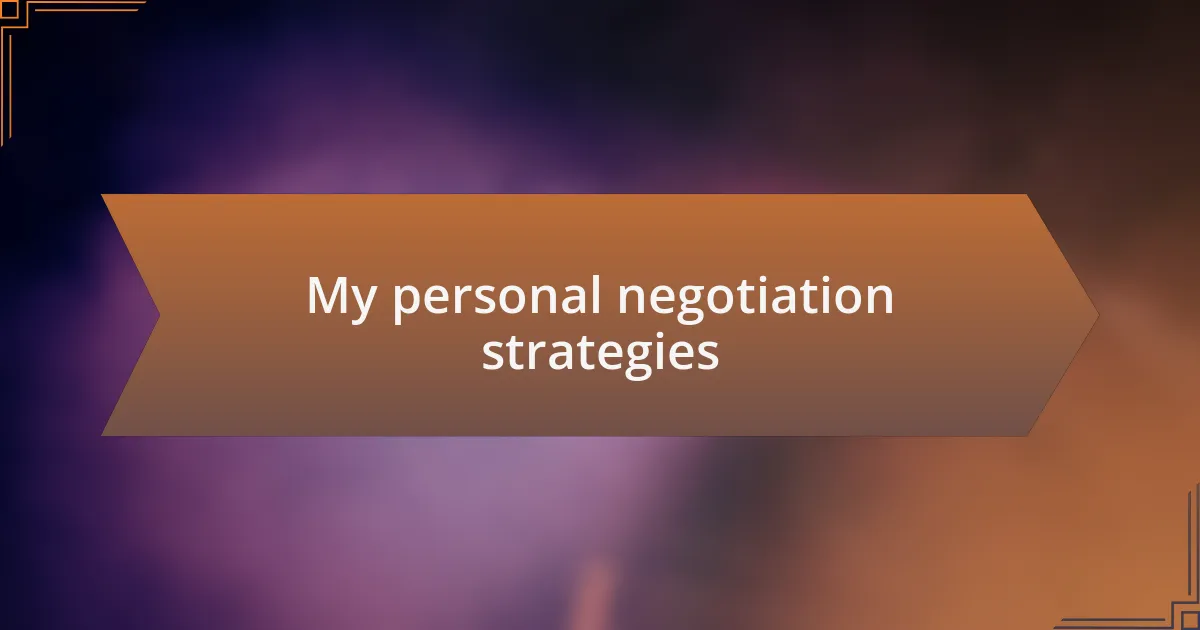
My personal negotiation strategies
When it comes to negotiating contracts, one strategy that I find invaluable is building relationships with venue representatives. I remember attending a venue site visit where I took the time to chat casually with the staff, sharing stories and laughter. This rapport translated into better collaboration later when I had to discuss contract terms. Have you ever noticed how a friendly demeanor can open doors that pure formality might keep shut?
Another tactic I swear by is preparing to walk away. There was a particular venue I was keen on, but the initial offer was far from what I needed. By articulating my willingness to explore other options, I signaled that I valued my budget and standards. Surprisingly, this prompted them to revisit their pricing and sweeten the deal. Isn’t it empowering to know that sometimes, a little pressure can lead to surprising concessions?
Lastly, I always advocate for clarity in communication. During a crucial negotiation, I asked specific questions about every line of the contract. It led to the discovery of vague phrases that could have cost me later. By insisting on articulating every detail, I not only secured better terms but also fostered trust. Have you ever felt that sense of relief when you finally understand every aspect of an agreement? It’s crucial for ensuring a smooth event experience.

Common pitfalls to avoid
One of the most significant pitfalls I’ve encountered in venue contracts is overlooking the fine print. I once signed a contract without fully understanding the cancellation policy, assuming it was standard. When an unforeseen circumstance forced me to cancel, I was shocked to find that I was forfeiting a hefty deposit. How often do we skip those details, thinking they won’t apply to us?
Another common mistake is failing to consider additional costs. I vividly remember a venue that seemed affordable at first glance, but hidden fees for setup, catering, and security crept in. It turned into a financial nightmare. Have you ever realized, too late, that a bargain isn’t what it seems? Knowing the total cost upfront can help you stay within budget and avoid unnecessary stress.
Lastly, I’ve learned that not getting everything in writing can lead to misunderstandings. There was a time when a verbal agreement about the number of tables provided became a point of contention weeks later. The feeling of uncertainty was nerve-wracking. Have you found yourself in a similar situation? Always ensure that every agreement is documented; it protects you and keeps everyone accountable.
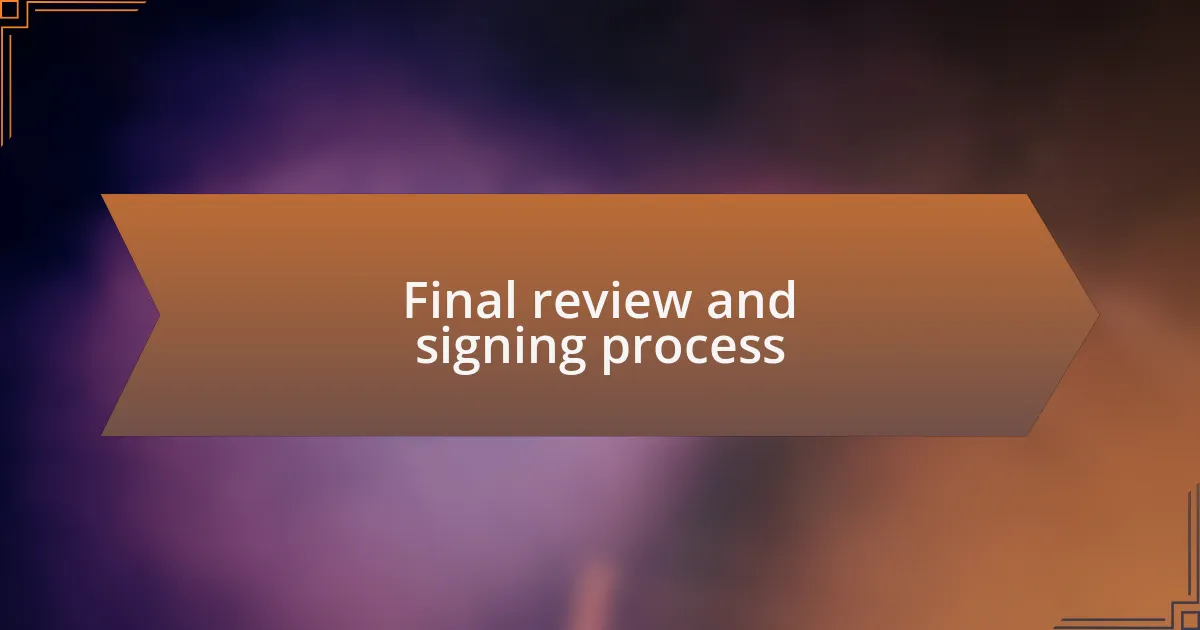
Final review and signing process
Once I reach the final review stage of a venue contract, I lean into a detailed examination of each clause. This step is crucial; I recall a time when I rushed through the review and overlooked a significant liability clause that could have exposed me to unexpected costs. Have you ever felt that rush before an event and skipped crucial steps? Taking the time to scrutinize every detail not only builds my confidence but also solidifies my understanding of potential risks.
When I sit down to finalize and sign the contract, I insist on having a clear communication line open with the venue representative. I often ask them to clarify any last-minute doubts or changes because it fosters transparency. After all, clear communication has saved me countless headaches in the past. Have you ever experienced the relief of confirming all details are squared away before signing?
I also find it beneficial to have a second pair of eyes review the contract before I sign. There was an instance when a colleague spotted an ambiguous term that could have led to misinterpretation. That moment taught me the value of collaboration in this process. Isn’t it reassuring to know that we don’t have to navigate these complex contracts alone? Having someone else weigh in can often uncover insights that I might have overlooked.